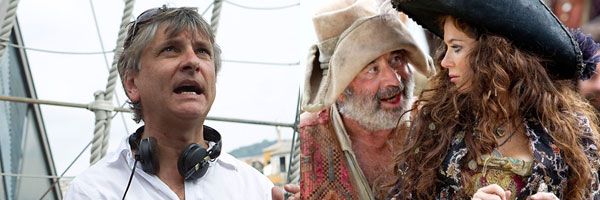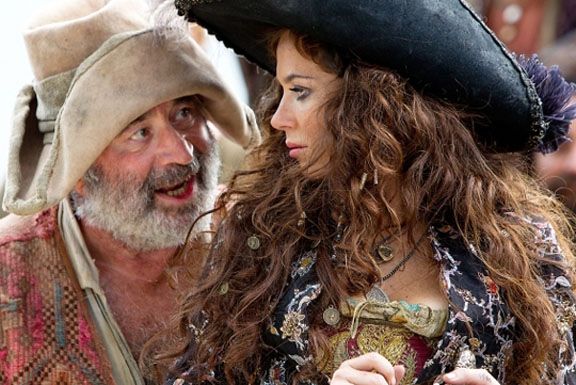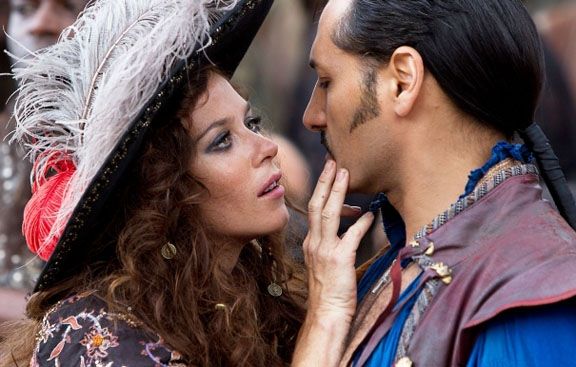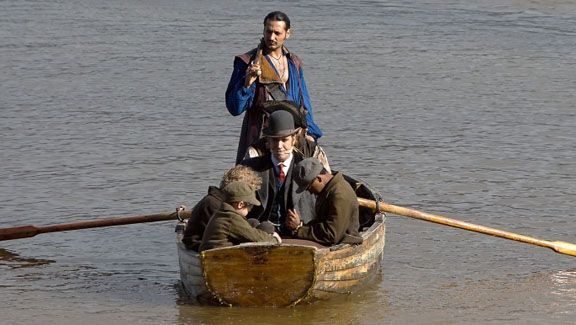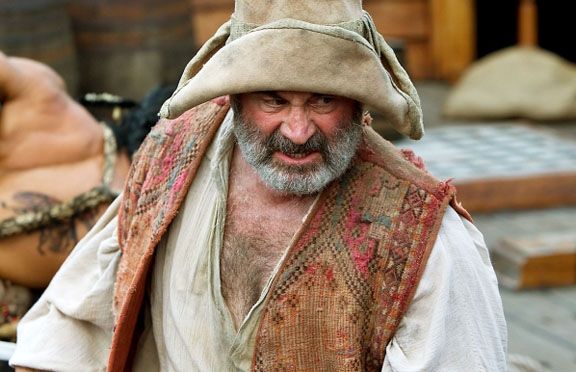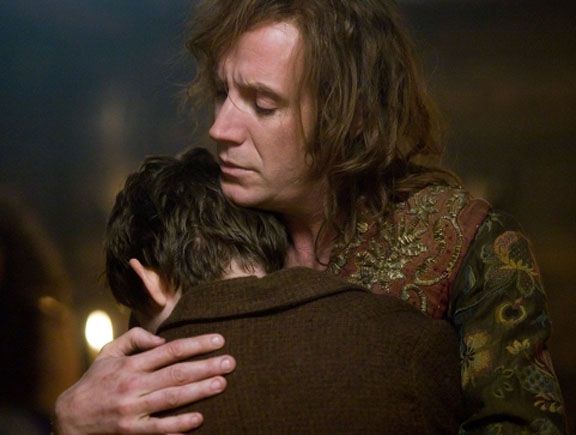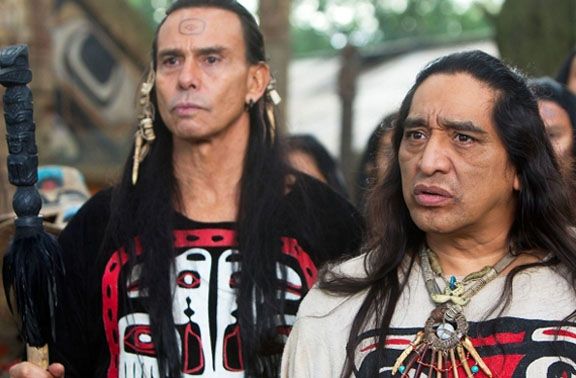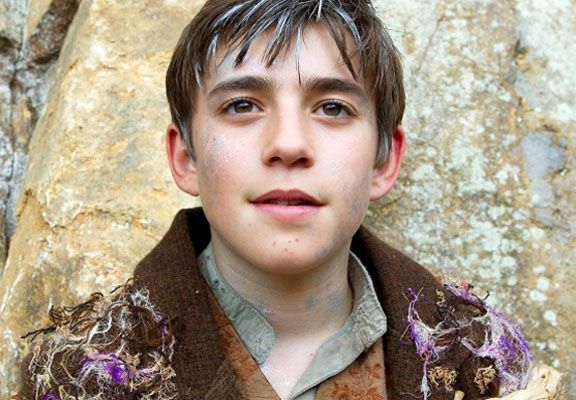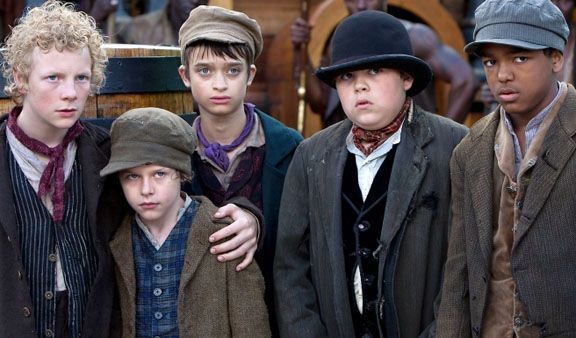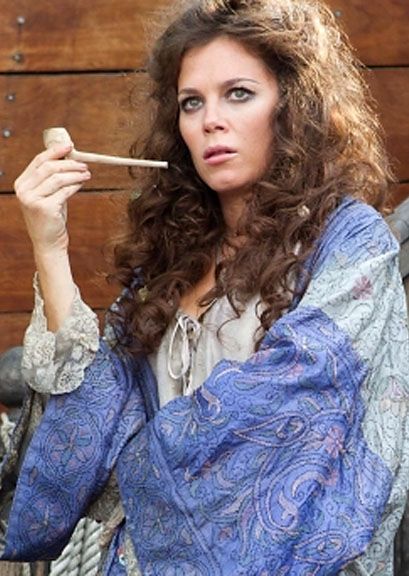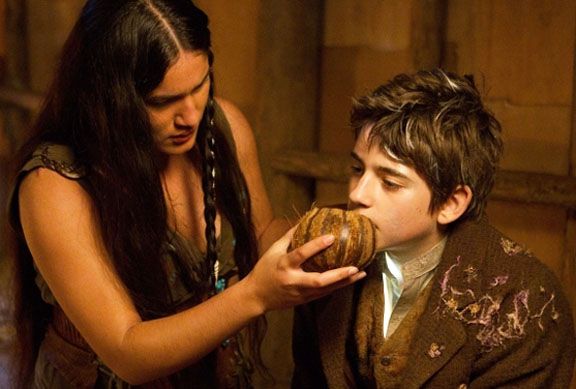Much like he did with Oz in Tin Man and Wonderland in Alice, writer/director Nick Willing is bringing Neverland to life, in a two-part original movie for SyFy, premiering on December 4th and 5th. An original prequel story to author J.M. Barrie’s classic Peter Pan, Peter (Charlie Rowe) and his young pickpocket pals are rounded up by their mentor Jimmy Hook (Rhys Ifans) to steal a magical orb, which inadvertently transports them all to another world, known as Neverland. Once there, they encounter power-mad pirates, led by the seductive Elizabeth Bonny (Anna Friel), a Native American tribe and a colony of tree spirits that possess a magical mineral dust that enables the pure of heart to fly. As the fight to protect and save this beautiful world escalates, Peter must decide whether growing old somewhere in time is more important than defending the place where he will never grow up.
During this recent exclusive phone interview with Collider, writer/director Nick Willing talked about what made him choose to go with a prequel to the Peter Pan story, the importance of remaining faithful to the tone of the book, how he would have loved to have been able to talk to Barrie about his work, assembling such a talented cast for the film, the challenges of bringing a fantasy world to life on a TV budget, and why he always finds himself pulled back to the fantasy genre. He also talked about already working on creating his next SyFy movie about another known fantasy world (he can’t reveal what it is because SyFy has not made the announcement yet), and that he is also creating his own world as a television series, set a little bit in the future. Check out what he had to say after the jump.
Question: What made you decide to write a prequel for this film, as opposed to any other point you could have started the story at?
NICK WILLING: I think it was something that probably dates back to when I first read the book, when I was younger. You know how when you really get into something and you’re mesmerized by that world? I’m one of those people that, when I read or get encapsulated by a world, I want to live and breathe and be there. I started to wonder, “Where did he come from?” There’s a line in the book where one of the Lost Boys says to Wendy, “Lost Boys are the babies that fall out of their prams, and their nannies forget them,” which was like a little joke, to me. It started to make me wonder, “Where did they come from? Why are they Lost Boys? Why don’t they want to grow up? Where in the hell did that pirate come from? What’s he doing there? Why are there Indians?”
Since I’ve grown up, I now know that it’s all to do with J.M. Barrie and the boys, and playing those games as kids. You imagine all the characters that boys like to imagine – pirates, Indians, mermaids and fairies – but at the time, when I was a kid, I had no idea. So, I wanted to know that, and that’s what motivated me to write the story. I wanted to figure out how it is that these characters got to that point, and how it is that a little boy doesn’t want to grow up. I remember that feeling, lying in bed and thinking, “I never want to grow up. I want to be like this forever.” But then, the next day, I wanted nothing more than to grow up. I was intrigued by what it is that gets a boy to that place. It’s rather a perverse place, if you think about it. My thesis was, “What is it that has made Peter into the boy who doesn’t want to grow up?” And then, I started to think, “Well, what if he starts out as the boy who does want to grow up?” So, that’s how the story happened.
When you got into the writing of the world, with all of the characters and the different parts of Neverland, were there any specific aspects of the original story that you were most excited about delving deeper into and explaining the origin of?
WILLING: I was intrigued by the whole thing. Mythology is one of those things that works because all the various bits work and are convincing. The detail makes it delicious and convincing, so I got very into it. I even started drawing trees when I was writing, and I started imagining what the world would look like. There wasn’t any one specific one that stood out for me. There were a few more I would have liked to have included. I would have loved to have had the mermaids in there. Maybe for the next one. And, I wanted to put the Never-bird in there. But, I couldn’t do everything.
The one thing I tried to remain faithful to is the tone of the book. The book is wonderful and mad and dark and funny, and one of the things that makes it dark is how terrible things happen in a rather off-hand, flippant way, and the characters sometimes comment comically on them. The pirates do horrible, unspeakable things, and they talk of murder most foul, but they do it in such a jolly way, which is very gallows humor and grown-up humor that’s dark and interesting. I didn’t go as far as J.M. Barrie. My films are a little bit lighter than perhaps he would have made, but I wanted to try to emulate that tone.
It’s very important for kids to grow up knowing that adults are capable of doing horrible things. All the fairy tales are designed to educate children and adults alike. Kids hate being lied to. They want to know the truth, and they want to learn that in a safe environment. That’s one of the things that movies and stories and fairy tales give them. It allows them to be comfortable in their parents’ arms, and yet learn about the world. That is the magic of fantasy. I don’t think it will ever disappear. It’s a genre that will always entrance because fantasy allows you to broach very serious, tough, often horrible, perhaps political subjects, in a way that is palatable. If some of this story was told in a realistic setting, it would be an R-rated movie. But, because there are flying fairies and magical worlds, we’re able to broach these subjects with children and family audiences.
In working on this, is there anything you would have liked to have asked J.M. Barrie, if you could have? Is there anything about his work that you would have most loved to talk to him about, if he were still around?
WILLING: I would have loved to have talked to him. He was such a monolith. He was so hugely genius that it was quite a daunting prospect to take this job on, in the first place. There has to be a certain amount of denial in the writer who takes it on. But in retrospect, I would have asked him all those questions that the little boys, who he invented the stories with, probably asked like, “Where do fairies come from? What are fairies for? How is it that they work? When is it that I start being able to fly?” In the story, there seems to be something about it that makes complete sense, without any explanation. It’s a beautiful thing. But, I’m one of those guys that wanted just a little bit more explained, so I could keep enjoying it.
Are there qualities in the character of Peter Pan that you most associate with?
WILLING: I’m a little bit older than Peter Pan. I think all men identify with that character, in one way or another, but it only becomes significant when you’re older. That’s why I was keen to try to give Hook a Peter Pan syndrome. There’s a fascinating thing in our film with how people cope, enjoy and treat the idea of living forever. I think a kid reacts differently to that then an adult. An adult is greedy and would want to do everything and experience everything, and would become a sensation-seeker. They wouldn’t be careful. Whereas a kid has a certain innocence and would treat that with more respect.
One of the beautiful things about the idea of living forever is what that does to your soul and how it changes you. Does it corrupt you, or does it make you pure? That, in itself, was a wonderful adventure to try to figure out how different characters would treat people. That’s really what Peter Pan is. He’s a little boy who will remain a little boy, forever. That’s most significant in the eyes of an older man, looking back at what might have been. So, I used that to explore Hook’s character, as much as I did Peter’s character. In our film, Hook is a man who has much that has yet to be done. I loved that. For me, the great relationship of this movie is between a little boy who wants to grow up and be like his hero, Hook, and how that relationship changes when his role model lets him down, betrays him, beats him and sells him out, so that he can have what the little boy already has.
With such a complicated role for a young actor, was it difficult to find the perfect Peter Pan, or did you just know that Charlie Rowe was the right actor?
WILLING: Well, I had worked with Charlie. I cast him in the very first thing he did, which was a one-hour movie that I did for the BBC, called Muddle Earth, with John Sessions. Charlie was the lead in that movie when he was 10. He had never done anything, but he was very, very good. So, when I came to cast Peter Pan, I knew how good Charlie was, and I knew that he looked perfect and he’d probably be perfect, but I kept telling myself that there had to be somebody else out there. I must have auditioned 500 kids, and I couldn’t find Peter Pan. It was terribly, terribly frustrating. I saw kids in Ireland, I saw kids in London, I saw kids in America, I saw kids everywhere. Two weeks before we started filming, and everybody was going out of their minds, Charlie walked in for the role of Fox and I just said, “Oh, shit, that’s Peter Pan. Why didn’t I admit that?” I suppose I had to go on that journey, to come back and realize that he was perfect, all along.
Was Rhys Ifans who you had always wanted for Hook?
WILLING: Yeah. Rhys is perfect because he is an actor who can play villainy and evil, very, very convincingly, and yet you feel for him because he has a very vulnerable side. When villainy is vulnerable and filled with longing and hunger, that’s when we can identify with it. And, when we can identify with villainy, then that becomes a character that is real and convincing to us. Rhys does that, all by himself. He makes that role plausible because of the kind of person he is. I actually had him in mind when I wrote it. He’s very tall, he’s got the right physique, he’s got those sad eyes, and he can be both beautiful and ugly, depending on his mood, and that’s very unusual. He’s a very special actor, in that sense.
He can also do one thing that, in fantasy movies, is very important. He can play it heightened without it seeming over-the-top. If everybody plays too realistic a role in a fantasy movie, it doesn’t work because then the world seems a bit out of place. You have to play them a certain way, and direct it and shoot it a certain way. It’s a bit like theater. A lot of English actors understand exactly what I’m talking about because they do a lot of theater. Theater has that style of acting in it that, on the stage, sometimes you have to be a little bit more than naturalistic, in order for the performance to work. The other thing about him is that he’s so committed to it. All the actors were. They’d run onto set, to get there and do the scene. They had loads of make-up and hair, and costumes, and swords and wirework and flying, but they’d run to the set. These actors were so incredible. They just were so committed to doing it.
Can you talk about the need for the invention of the Elizabeth Bonny character, and casting Anna Friel to play this woman who is part villain and part seductress?
WILLING: Well, I wanted a woman to liberate Hook. Hook starts out as a repressed Edwardian man. He has so much bottled inside him that he cannot enjoy life. He is paying a penance for his misdeeds. In order to unlock and liberate him, and allow him to enjoy the evil that wants, I needed a woman. Only a woman can do that to a man. That’s when it got me thinking, “She has to be the woman that he takes over for,” so I created a female pirate captain. Female captains were quite common, actually. There were several in the West Indies, and there was one very famous one, called Granuaile, in Ireland, who was eventually pardoned by Queen Elizabeth I, through her rebellious work. Anna researched those real characters and tried to create a convincing version of that. One of the first questions she asked me, when I first talked to her, was, “How is it that this slight woman is able to run a boat with 50 tough men?,” and the answer I gave her was, “They used to do it, all the time.” It’s because she is a slight, beautiful woman, and she has the ability to manipulate. Women are much smarter then men and often are much more political creatures, so they can have the ability to manipulate men, particularly on a boat.
Anna was also my first choice for that role. She’s tough, she’s got a steal core to her, she’s quite small, and she’s irresistible. She’s sexy as hell, which was part of the unlocking of Hook. Those are the qualities that Elizabeth Bonny has. Elizabeth Bonny does the worst things in the film of anyone, and somehow they seem plausible when she does them because you understand what it is that she needs and where she comes from. The story then becomes, “How is it that Hook becomes Hook?” It’s the making of a villain. It’s also about how Peter becomes Peter, in his soul. It’s the making of a boy who doesn’t want to grow up. I tried to follow that goal through, with as many of the characters as possible.
When you asked Bob Hoskins to play Smee again, after already having done so in Hook (1991), were you surprised that he agreed?
WILLING: When I was writing the Smee character, I only had him in my head because he’s such a perfect Smee. The thing about Bob Hoskins is that, whenever you see Bob Hoskins, he’s like an old friend. You want to just give him a hug. He’s extremely hugable, in real life. He’s very, very sweet and totally charming. That’s one of the aspects of Smee that I thought was important. He also did unspeakable things, but in a very lovable way. That goes back to what the book does, which is to dress up the macabre with a smile. So, I asked Bob and he said, “Yeah, all right.” I said, “You don’t mind doing it again?” He said, “What, are you joking?! I’ve already done all the research.” He did do it very differently, in my film, but he was perfect, and he was a pleasure to have around. Everybody was in love with him. He’s a charming man.
Was it difficult to decide on a voice for Tinkerbell?
WILLING: I couldn’t think of her being anything but English, for the voice. I thought that was important. In the book, she doesn’t speak, as such. Peter understands her. They have this inner voice, but you never actually hear it. In my film, I was keen to try to hear that inner voice, and I thought it should be an English voice. When you’re casting, the way it works is that you think to yourself, “Who is the person I most want? Who would be most perfect?” So, I thought Keira Knightley was the most perfect. She’s almost like a fairy. She’s so beautiful. She has this clear, beautiful voice, and she has that English accent that’s not totally posh, but that is timeless.
She had to be English because she’s an inner voice and he’s English, so he would hear her speaking in an English accent. If the voice is in his head, he wouldn’t hear her speaking in Italian. He’d hear her speaking in a voice that he would regard, so that was how it worked. I thought of Keira Knightley, and I was totally amazed when she said yes. She read the script, was intrigued by it, and said yes, right away. She came in and she was fantastic. She really worked very, very hard on the nuance, which is difficult when you’re doing a voice. The timbre and nuance of how you say something has very different implications, so she worked very hard at that. She was incredibly conscientious, and such a beautiful woman.
What advantages were there in doing this for SyFy, and did doing Tin Man and Alice prior to this help prepare you for making Neverland?
WILLING: That’s a good question. I haven’t worked with that many networks, but one of the things I’ve noticed about SyFy is that not only are they willing to take risks and experiment, they actually encourage it. They will often make the more difficult choice, in order to get something that’s a little bit more unusual. For instance, if I made this as a big studio picture, I might not have been given as much freedom. SyFy obviously trusts me because they liked my other films, but even when I did Tin Man, the first one, they trusted me then, and I had never worked with them before. I think that’s one of their hallmarks. Once they make a decision on who to go with, they’re very supportive.
The other thing that’s interesting about working for them is that they’re one of the few networks that still makes event mini-series. That’s important because you’re able to explore, in more depth, characters and their relationships, and you can hopefully make a more interesting film, but it’s still a complete story, unlike a series, which has lots of smaller stories. It’s one big, sweeping story, and it’s unusual in television now to make a four-hour mini-series. It used to be done a lot, but not so much anymore.
Finally, the other great thing, working for them, is that they make one of these every two years or so, and they really get behind it, which is important. It took me 18 months to make this film and I put everything into it. It almost killed me. And it would break my heart, if it went out on a Tuesday night at one in the morning, and nobody saw it. They do put a lot behind it. I love working for them. The other thing about them is that their executives are very smart. There’s a guy at SyFy, called Mark Stern, who is incredibly clever. He was great with the script, very insightful, great on the story, and he gets the look of the film. I haven’t worked with that many executives, but he seems, to me, to be quite unique. It’s not often that you get a director, singing the praises of his executives, but in this case, it’s really true. I think he’s a remarkable guy. He’s the one who first got these re-imaginings. He said, “There’s an enormous well here, with the re-telling of classic stories, in a different way. Let’s re-invent the wheel and really experiment.” And now, everybody is doing it.
How difficult is it to bring a fantasy world to life on a TV budget?
WILLING: If you have a certain budget, you have to design the world in such a way that you can do it for that. There are ways, if you know the tech well enough – and I’ve been doing it for awhile – where you can figure it out. With that money, comes a price. You sell your soul for that money because with it comes 100 executives and you’re constrained and you can’t take the risks. I took a lot of big risks, making this film, and I was given enormous freedom, which I think pays off. A studio wouldn’t allow me just to draw my own world. It would all be researched and tested. And then, in the end, it may not be better that way, anyway. Often, designing your way out of problems is better than having a tantrum and asking for more money, and not getting it.
If you’re going to do Neverland, Wonderland and Oz, the audience is going to sit there and say, “Okay, what’s it look like?” It can’t be a forest in Dublin. You can’t just wonder around Central Park. It’s got to knock their socks off. So, that keeps me going, to try to do something that they’ve never seen before. It’s just in the imagination, really. If you just sit in the bath long enough, it will come to you.
A lot of the bravest stuff that you see now is on television. It didn’t used to be like that. Cinema was always taking the big risks, and TV was ambling along behind, just trying to touch the hem. Now, it doesn’t work like that. Big actors want to work in television because they see it as being new and different. It means that I can ring up Keira Knightley and ask her to do this, and have her say yes, or Bob Hoskins, or Kathy Bates for Alice, or Zooey Deschanel and Richard Dreyfuss for Tin Man. They want to do it because they’re inspired by the freshness of it. A lot of big movies now are getting bogged down, and then they reach for special effects as a way for getting them out of a hole. If the eye candy is good enough, they don’t think it matters what the hell the story is doing.
Having explored Oz, Wonderland and Neverland, are there more fantasy worlds that you would like to explore, or would you also like to create one of your own?
WILLING: I am writing something else, at the moment, that is a fantasy world, but I can’t tell you what it is, or I’d have to kill you. It is another fantasy world that is known, and it is for SyFy, but I’m not allowed to tell you what that is because they’re supposed to announce it, if it gets going. And, I am also working on creating my own world, which is set a little bit in the future. That’s a show that I’ve been writing, on and off, for awhile. That’s a series for television that could run and run. It’s something that I’m very excited about. I don’t want to jinx it, by saying the title out loud, but it is my own invention, although it’s very similar to things that we all know and understand.
Do you see yourself staying in the fantasy genre?
WILLING: It would be much easier for me to take my camera onto the street and shoot a romantic comedy, or something. I would love to do that again. But, I always find myself pulled back into the fantasy genre, and I can’t really explain it. What I do know is that one of the things that turns me on the most is imagining new worlds, just as I did as a kid, when I listened to fairy stories and imagined what they looked like and what those worlds were like. Making films of that kind brings that childlike wonder to the screen. That, to me, is one of the things that I love doing. That keeps pulling me back to doing fantasy ‘cause I want to keep doing one better. In some ways, this is one better than the last one. The world is a bit more formed and beautiful and different.

